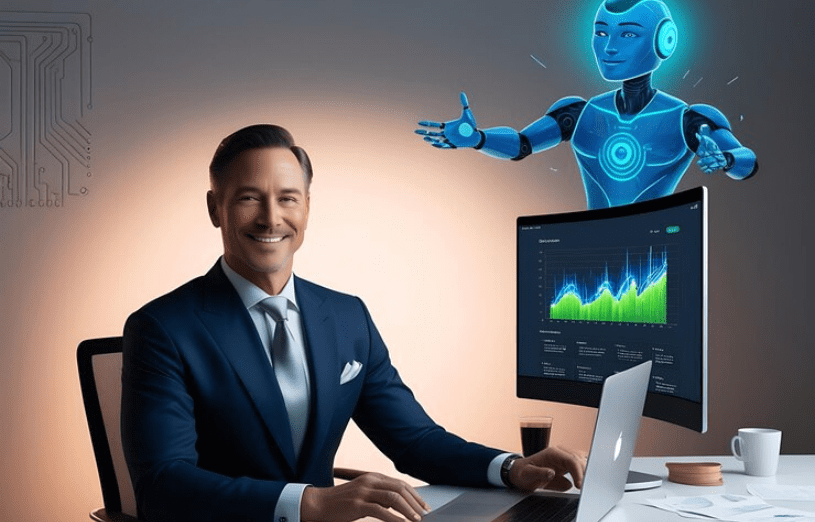How Artificial Intelligence Changes the Future of the Accounting Industry?
The accounting industry, which has long been known for its manual and very detail-oriented tasks is redefining the norm like never before. The catalyst? Artificial intelligence (AI). With this growth, the shape of accounting to come will be significantly new—in a way that should spell greater accuracy and efficiency, as well as strategic relevance. Here we discuss the impact of artificial intelligence for anyone who would be an accountant & business.
Accounting Transformation: Traditional to Trailblazer
Accounting has come a long way from its humble beginnings as different manual procedures to the incredibly complex software that we use today over the past century. Artificial intelligence, however, is on a different scale: it marks an epochal rupture from the past that will even reimagine where and what accounting constitutes. AI is not only taking the industry forward; it is leading us to an unknown future.
How AI is Transforming Accounting: A Game-Changer
Ai, certainly sounds too good for accounting. The automation of these high-technology kinds aims to have an industry-leading operating model via AI technologies like machine learning, natural language, and robotic process automation so as to introduce more accuracy in the process, leading to less time consumption & unlocking further strategic insight.
Tasks that are Routine: Efficiency in Release
AI is extremely effective at automating repetitive, tedious work. Now it is true that AI software, in fact, manages to increase the data entry processing faster than never before—previously manually entered and hence prone to reliability errors. This streamlines the process and makes accountants free from that work to spend time only on what has a higher impact, value-adds or innovation.
It frees scalable and more engaging routines for accountants like looking into natural flow patterns of money, rather than making manual entries. This allows insights from the data to be harnessed that further revolutionizes internal accounting department operations.
Better Data Analysis & Decision Making: Paving Way for Strategic Insights
Huge nests of financial data were, until recently impossible to process in any kind of time needed by an agent. AI can now handle the reams of real-time big finance. Machine learning has the power of unveiling hidden patterns, trends and correlations in complex mathematical models that are not detectable by human eyes. This creates new depth of strategic analysis improving forecasting, risk assessment and financial planning.
This also means that the Accountant becomes equipped with analytics, but this time around it is Analytics with wings and AI Powered Analytics thus ensuring giving businesses a missile or rather atom bomb in their armory, which helps him/her succeed. Whether identifying the areas with potential cost savings or detecting patterns of fraud, AI provides that next level up in decision making.
Stronger Compliance and Risk Management: Strengthening Your Financial Castle
AI The Ultimate Compliance and Risk Watchdog: Dealing with the investment of capital, compliance and risk management are part-and-parcel in accounting—a clear area where AI plays its big stick. AI tools monitor the systems on a daily basis for every transaction, book of accounts to immediately highlight any deviation or an indication of a regulatory breach coming up. In this way of compliance, you get a better protection around your financial fortress which minimizes the attack chances from penalties and legal issues.

AI, in addition to compliance as an ally of risk management. AI Establishes a Firm Base For Companies By Clearly Measuring Each Risk Multiple-Time, which helps companies for defining risk at the time of strategy development. This is particularly important for fields in which regulatory testing poses particular difficulties.
Automating Auditing with AI: Accuracy and Efficiency Redefined
It is also a very efficient way to penetrate the audit market using some of these ideas I mentioned above. Audit is now evolving from sample transactions to all data values through AI. The process of being this holistic allows for a precise and productive behavior audit. Programmed with the power of AI, machine learning and other related technologies like big data, these tools are designed to catch faster than light any anomalies or errors while some fraudulent work is going unnoticed in a manually audited environment. This provides high reliability of completed audits and decreases cost and time which allows the auditors to focus on reviewing the results, giving strategic advice.
Personalized Financial Advisory Services: Building Relationships with Your Clients
The accountants are rapidly deploying AI to provide financial advisory services. Through using data analytics powered by AI, accountants can provide individualized financial guidance perfectly catered to his/her clients’ personal needs and goals. AI increases the level of service whether optimizing investment strategies, tax planning or retirement savings.
Until recently only available for the firms’ top clients, this tailored perspective is now more generally available, allowing your firm to better customize relationships and stand out in a tough competitive market.
The Future of Accountancy: Embracing Opportunities and Tackling Challenges
Although Artificial Intelligence is making its way through the future of accounting, it beckons golden opportunity as well as hurdles and obstacles. Opportunities are ready to be seized and challenges await professionals and businesses taking their first steps in this new era.
Opportunities for Accountants: Realizing the Possible
The introduction of AI in accounting processes brings us a plethora of opportunities where an accountant can level up his/her skills and grow their career. As such, accountants proficient at AI-powered tools and technologies will be leading the industry while securing strategic positions as financial analysts, data scientists or even advisers to AIs.
AI, however also enables accountants to provide more value-added services by furnishing data-driven insights and recommendations. Moving away from transactional activities to strategic advisory roles is a compelling change accountants can make and use it as a springboard for professional development.
Challenges and Ethical Considerations: How to Negotiate the Moral Minefield
The ability of AI to offer unique benefits is powerful, but also includes challenges and ethical questions we cannot ignore. Job loss from job automation by AI Doing away with a routine role using AIOlympia Oghlakyan on I in Artificial Intelligence However, this same challenge creates an opportunity for accountants to level up their skills in becoming something closer related to human judgment and creativity roles.

As AI systems grow in complexity, so too do ethical concerns. There are real risks of AI being used to falsify financial data or engage in unethical behavior, and accountants need to guard against this as appropriate for the individual profession.
Changing Accountant Brief: The Long Run of Transformation
Accountants’ work is changing dramatically as AI changes the accounting sector. Through some of my posts here, I break down the main benefit of a business, which is that accountants are more essential than ever. Completing strategic tasks relying on conceptual thought and innovation, AI prolongs it rather than replacing payroll. Accountings are responsible for translating AI-generated data, creating novel solutions, and steering the integration of ethical use by accountants.
The future of accounting is not AI replacing human expertise. The answer to that discretion depends on a powerful partnership between it and accountants, where they work together for extraordinary outcomes.
Most Shared: Is This The End Of Accountancy As We Know It?
A symbiosis of AI and human expertise will decide the future of the accounting industry. AI offers powerful benefits that can greatly improve efficiency, accuracy and the strategic value provided by accountants. The businesses that invest in AI-powered tools and training for their accounting teams will be prepared to succeed within this landscape, which has been fundamentally changed.
At the end of the day, AI is doing more than just altering accounting processes. It’s reinventing them all together. AI presents an horizon for the future where accountants will no longer spend time toiling on repetitive tasks or ensuring compliance and is free from their shackles when it comes to obtaining strategic insights. But by embracing this change and evolving with the times, accountants and businesses can embrace automation to harness the opportunities while overcoming these significant challenges head-on.